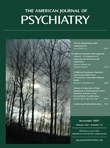Low Extraversion and High Neuroticism as Indices of Genetic and Environmental Risk for Social Phobia, Agoraphobia, and Animal Phobia
Abstract
Objective: The authors examined the extent to which two major personality dimensions (extraversion and neuroticism) index the genetic and environmental risk for three phobias (social phobia, agoraphobia, and animal phobia) in twins ascertained from a large, population-based registry. Method: Lifetime phobias and personality traits were assessed through diagnostic interview and self-report questionnaire, respectively, in 7,800 twins from female-female, male-male, and opposite-sex pairs. Sex-limited trivariate Cholesky structural equation models were used to decompose the correlations among extraversion, neuroticism, and each phobia. Results: In the best-fitting models, genetic correlations were moderate and negative between extraversion and both social phobia and agoraphobia, and that between extraversion and animal phobia was effectively zero. Genetic correlations were high and positive between neuroticism and both social phobia and agoraphobia, and that between neuroticism and animal phobia was moderate. All of the genetic risk factors for social phobia and agoraphobia were shared with those that influence extraversion and neuroticism; in contrast, only a small proportion of the genetic risk factors for animal phobia (16%) was shared with those that influence personality. Shared environmental experiences were not a source of correlations between personality traits and phobias, and unique environmental correlations were relatively modest. Conclusion: Genetic factors that influence individual variation in extraversion and neuroticism appear to account entirely for the genetic liability to social phobia and agoraphobia, but not animal phobia. These findings underline the importance of both introversion (low extraversion) and neuroticism in some psychiatric disorders.



